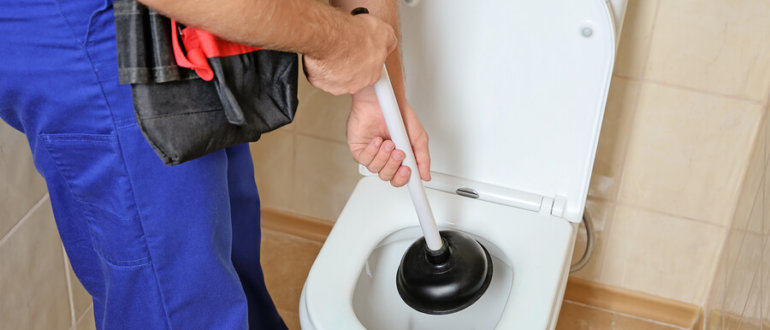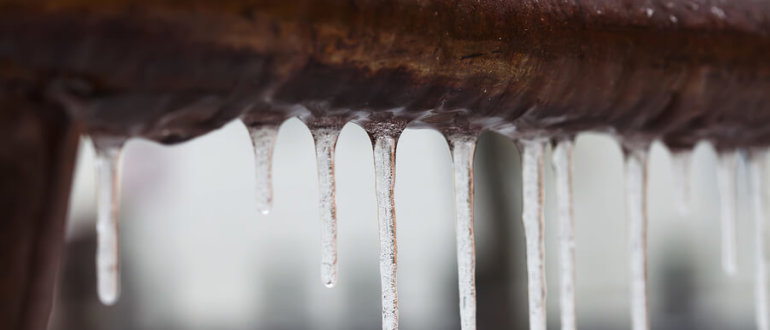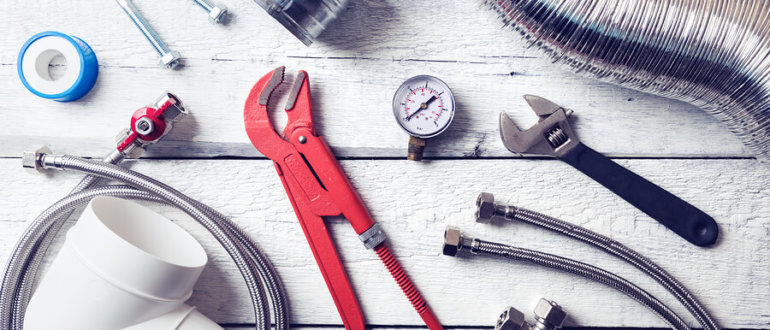Important Steps to Winterizing Your Plumbing
Tis the season to be jolly. But we doubt that jolly will be one of those adjectives that will describe you if you experience a flood or leak due to frozen pipes! Don’t wait until it happens to you. Be proactive and winterize your plumbing so you can continue being jolly for the rest of the season.
Why is Winterizing Important?
Proactively winterizing your plumbing is a critical way to avoid frozen pipes in the winter. When pipes freeze, they can burst and cause incredible damage to your home. Winterizing ensures that pipes, drain lines, fixtures, and faucets are protected against winter freezing.
The High Cost of Water Damage
One of the costliest damages that can happen to your home is the cost to repair a burst pipe and the damage it causes. According to State Farm Insurance, the average homeowner’s insurance claim for frozen pipes averages around $15,000 but can run far more in cleanup costs. If a pipe burst is easily accessible, a small emergency repair to a pipe can still cost several hundreds of dollars for a Philadelphia plumber. Conversely, the cost of averting a frozen pipe emergency is relatively negligible.
Keep Your Heating System Maintained
In the dead of winter, the last thing you want is for your furnace to break down. Call a professional Philadelphia HVAC repair company to ensure that your system is ready for winter.
Inside Winterizing
You should first know where your emergency shutoff valve is and know how to operate it. In the event of any burst, shutting off the main water source is your first line of defense and crucial to avoid costly water damage.
Pipes and faucets that are located in your unheated garage, in the basement or crawlspace of your home or any other unheated area should be insulated. This can be done with special insulation sleeves or special heat tape. All exposed pipes should be insulated, even those in hard to reach places. Don’t leave any gaps in the insulation. If you are not comfortable with doing this yourself, you should schedule the services of a Philadelphia plumber.
Another way to ensure that pipes don’t freeze in particularly harsh winter weather is to open kitchen and bathroom cabinet and pantry doors to allow warmer air access to areas that may be less insulated and harbor plumbing pipes. If you are leaving your home vacant for any period of time, make sure to leave the interior heat on and set it to about 60 degrees.
Outside Winterizing
Inspect the exterior of your home and seal any visible cracks with caulk or spray foam insulation. Make sure to disconnect any hoses and turn off water to outside outlets. Close any foundation or exterior vents.
Call an Expert
If you need help winterizing your home, call a professional. The Philadelphia plumbers at Affordable Fixes LLC will help ensure that your home will be safe from bursting pipes this winter and avoid costly water and flood damages in your home. Call us today for peace of mind.
Some Simple Fixes When Your Toilet Runneth Over
The holidays are drawing near and for many families, that means lots of visiting family — and clogged toilets. Yes, they can be embarrassing, which is why you may not find out about a clog until your toilet runneth over. Not fun.
The causes can be many. From a simple flushing of too much paper to larger clogs down inside the plumbing lines, here are some of the most common causes of a toilet clog and what you may be able to do to troubleshoot them.
Water Saving Toilets
If you have an earlier incarnation of a low-flow toilet, it may not have the power of today’s versions. These earlier toilets did save water but they often didn’t have enough flushing power to push contents through. In these cases, it is a case of upgrading to a more powerful unit alleviating a constant problem with clogs.
Flushing Anything But Toilet Paper
You heard us right. Toilet paper is made to break down in the toilet. But other things as simple as tissues, cotton balls, facial cleansing wipes or even dental floss are simply not made to be flushed. When these items get caught in the drain of a toilet, they will not break down and can create a clog. Most often, plunging will push a simple clog down but there are times when you may need the professional help of a Philadelphia plumber.
Flapper Isn’t Flapping
Inside the tank of your toilet, there is a rubber gasket at the bottom called a flapper. Its function is to open when you flush, letting water in the tank move down into the bowl. If the flapper is malfunctioning or old, it may not be opening completely. For most homeowners, this is a simple DIY fix with a chain adjustment or a new flapper from your local home improvement store.
A Problem in the Trap
Your drain pipes have a trap which is a bend at the pipe that prevents odors from coming up into the home. This bend can also result in clogs. If a plunge doesn’t move the clog through, you will want to consult a plumber in Philadelphia for an expert repair.
Your Vent
You will have a plumbing vent on your roof allowing fresh air into your system. If this vent becomes clogged with outside debris such as leaves or dirt, it can result in stopped up drainage and even malfunctioning toilets. Cleaning the drainage vent is best left to a professional.
The Sewer Line
Unfortunately, there are times when the issue can be a clog, a break, or tree roots infringing on the main sewer line. Because it involves digging at the sewer lines often on private property, this requires the skill of a professional plumber. You will want to request a professional who uses a camera in order to inspect the lines prior to digging.
When you need the skill of a professional plumber in Philadelphia, call the experts at Affordable Fixes LLC. For over 30 years, we have been the professionals more residents have trusted for their plumbing and HVAC needs.
Frozen Pipes Are No Joke
It’s difficult to think about winter just yet as the last remains of summer are so close, but the reality is that winter is inevitable. And with it comes some inherent problems when it comes to our household plumbing.
Unless you have experienced it or know someone who has, you may not appreciate that frozen pipes are not only inconvenient but can be extremely damaging to your home and your belongings. One of the most important things to consider when doing regular home maintenance is considering how your plumbing will stand up to winter weather.
Areas That Are More Vulnerable
In many cases, pipes are vulnerable to freezing when the homeowner is away and temperatures inside dip to below freezing. But this is not always the case. Pipes can freeze in certain areas of the home even if you are home and living comfortably inside. When it comes to frozen pipes, there are areas of the home that are most vulnerable.
Exterior walls — any pipes located along the exterior wall of a home will experience lower temperatures. If these pipes are not adequately insulated, they will have no protection against those winter temperatures and can be vulnerable to freezing.
Attics and basements — pipes that are located in attics and basements may be more vulnerable to freezing. Out of sight, out of mind, they say. But these areas of your home may be more susceptible to cold temperatures and require that added insulation.
Early Signs
One of the first signs that your pipes may be frozen is the lack of water coming through them. If water is not coming through your household faucets, it’s a sure sign that there may be a frozen obstruction. If you see frost on any of your pipes or you are experiencing strange smells coming from your drains or faucets, this can be another indication.
What to Do
If you suspect that a pipe may be frozen, it’s important to act immediately. If you know the location that is frozen, you can work to quickly thaw the area or call your Philadelphia plumber for an emergency call.
If you choose to thaw the pipe yourself, you should open both hot and cold handles of the faucet that the pipe feeds into. If the pipe is easily accessible, you can apply heat until you see that water is moving through the faucet. This can be done with a hair dryer, a heat lamp or space heater, hot towels, or electrical heating tape.
If the pipe isn’t accessible, but you know basically where the frozen area is located, you can place an infrared lamp at the location and turn up the heat in the home.
Prevention Techniques
To ensure that you aren’t a victim of a frozen pipe this winter, here are some recommendations from the American Red Cross:
Keep garage doors closed if there are water supply pipes inside.
Open cabinet doors to permit warm air closer circulation to pipes in the kitchen and bathrooms.
If the weather is excessively cold, let water slowly drip from any faucet that may be fed by outside pipes.
Keep the thermostat consistent both day and night. Lower nighttime temperatures can equal costly repairs.
If you leave your home for an extended period, keep the heat on in your home with the thermostat set no lower than 55°F.
Call a Professional
In the case where you have not been able to head off a plumbing emergency due to frozen pipes, call the emergency Philadelphia plumbers at Affordable Fixes LLC.
Summer Routine Checks for Your HVAC and Plumbing
Affordable Fixes, LLC is one of the most trustworthy and dependable air conditioning, heating, and plumbing contractors in the greater Philadelphia area.




